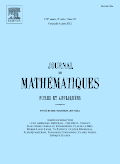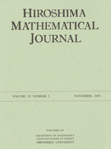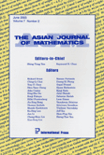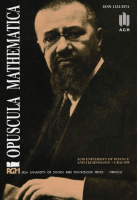
JOURNAL DE MATHEMATIQUES PURES ET APPLIQUEES
Scope & Guideline
Advancing Mathematical Frontiers
Introduction
Aims and Scopes
- Algebra and Geometry:
Research on algebraic structures and geometric properties, including studies on manifolds, algebraic varieties, and topological spaces. - Partial Differential Equations (PDEs):
Exploration of both linear and nonlinear PDEs, with a focus on existence, uniqueness, and stability of solutions, as well as their applications in physical models. - Functional Analysis and Operator Theory:
Investigations into the properties of functional spaces and linear operators, including spectral theory and applications to quantum mechanics. - Mathematical Physics:
Application of mathematical methods to problems in physics, particularly in the areas of fluid dynamics, thermodynamics, and quantum mechanics. - Stochastic Processes and Control Theory:
Research into stochastic models, control theory, and their applications in various fields, including finance and engineering. - Numerical Analysis and Computational Mathematics:
Development of numerical methods for solving mathematical problems, particularly those arising from PDEs and optimization problems. - Mathematical Biology and Ecology:
Mathematical modeling of biological systems and ecological dynamics, focusing on reaction-diffusion systems and population dynamics.
Trending and Emerging
- Nonlinear Dynamics and Chaos Theory:
There is a growing focus on nonlinear dynamics, particularly in relation to complex systems, indicating an interest in understanding chaotic behavior and stability. - Mathematical Modeling in Biology and Medicine:
An increasing number of studies are dedicated to mathematical modeling of biological processes, including epidemic models and tumor growth, highlighting the relevance of mathematics in public health. - Machine Learning and Data Science Applications:
Emerging research applying mathematical theories to machine learning and data science, showcasing the interdisciplinary nature of contemporary mathematics. - Quantum Mathematics and Quantum Field Theory:
A notable increase in papers discussing quantum mathematics reflects the ongoing interest in quantum fields and their mathematical underpinnings. - Geometric Analysis and PDEs:
Heightened interest in geometric analysis, particularly in relation to partial differential equations, indicates a trend towards integrating geometry and analysis in modern research.
Declining or Waning
- Classical Mechanics Applications:
Research related to classical mechanics, particularly in deterministic systems, appears less frequently, possibly due to a shift towards more complex or stochastic models. - Elementary Number Theory:
Papers focusing on basic number theory concepts and classical results have diminished, indicating a trend towards more applied or interdisciplinary approaches. - Topology and Knot Theory:
While still relevant, the volume of research in topology and knot theory has decreased, perhaps as researchers pivot towards more applied mathematical frameworks. - Discrete Mathematics and Combinatorics:
Interest in discrete structures and combinatorial strategies seems to have waned, with fewer papers addressing foundational problems in these areas.
Similar Journals

Moscow University Mathematics Bulletin
Bridging Theory and Practice in MathematicsMoscow University Mathematics Bulletin is a distinguished academic journal published by Springer International Publishing AG, focusing on the dynamic field of mathematics. With an ISSN of 0027-1322 and an E-ISSN of 1934-8444, this journal serves as a platform for innovative research and developments in various mathematics sub-disciplines, making significant contributions to both theoretical and applied mathematics. While it holds a Q3 ranking in the field of Mathematics (miscellaneous) for 2023, this journal remains dedicated to fostering academic discourse among mathematicians. Researchers, professionals, and students will find value in the diverse range of articles that embody rigor and creativity. Although currently not an Open Access publication, the journal provides numerous access options through institutional or personal subscriptions. From its inception in 2007 to its expected continuity until 2024, the Moscow University Mathematics Bulletin is committed to enhancing the understanding and appreciation of mathematical sciences.

Hiroshima Mathematical Journal
Exploring the Depths of Algebra, Analysis, and BeyondThe Hiroshima Mathematical Journal, published by Hiroshima University, Graduate School of Science, serves as a prominent platform for disseminating high-quality research in the field of mathematics. Established in 1959, the journal has been an integral part of the mathematical community, focusing on areas such as Algebra, Number Theory, Analysis, and Geometry and Topology. Although currently classified in Q4 quartile rankings within its categories, the journal is committed to advancing mathematical knowledge and fostering scholarly dialogue. Its accessibility, combined with its long-standing history, makes it an essential resource for researchers, professionals, and students dedicated to exploring and enhancing the mathematical sciences. For those interested in contributing or accessing cutting-edge research, the Hiroshima Mathematical Journal continues to uphold its mission of excellence in mathematical scholarship.

Asian Journal of Mathematics
Bridging Theory and Application in MathematicsAsian Journal of Mathematics, published by INT PRESS BOSTON, INC, is a premier scholarly journal dedicated to the expansive field of mathematics. With an ISSN of 1093-6106 and E-ISSN 1945-0036, it serves as a crucial platform for disseminating innovative research and methodologies in various mathematical domains. Established in 2005, the journal has garnered a significant reputation, currently holding Q2 rankings in both Applied Mathematics and Mathematics (miscellaneous) categories as of 2023. The journal aims to bridge theoretical research with practical application, making it an essential resource for researchers, professionals, and students seeking to advance their understanding and application of mathematical principles. Although it currently does not offer open access options, the journal's commitment to quality and rigor ensures its place as an influential reference within the mathematical community. Its office is located at PO BOX 43502, SOMERVILLE, MA 02143, United States, strategically positioning it as a key contributor to global mathematical discourse.

Ukrainian Mathematical Journal
Advancing Mathematical Frontiers Since 1957The Ukrainian Mathematical Journal is a prominent academic publication in the field of mathematics, focusing on a diverse range of topics that appeal to researchers, professionals, and students alike. Published by Springer, this journal has been an important platform for disseminating significant mathematical research since its inception in 1957. With the aim of fostering knowledge and collaboration within the mathematical community, the journal curates high-quality articles that meet rigorous scholarly standards, evidenced by its Q3 ranking in the miscellaneous mathematics category for 2023. Although it currently does not offer open access, the journal remains accessible through various institutional subscriptions. It serves as a vital resource for ongoing discourse in the field and invites contributions that further advance mathematical understanding.

BOLETIN DE LA SOCIEDAD MATEMATICA MEXICANA
Pioneering Insights in Diverse Mathematical FieldsBOLETIN DE LA SOCIEDAD MATEMATICA MEXICANA, published by Springer International Publishing AG, is a pivotal journal in the field of mathematics, particularly recognized for its contributions to the miscellaneous mathematics category, holding a commendable Q2 ranking as of 2023. With an ISSN of 1405-213X and an E-ISSN of 2296-4495, the journal serves as a platform for disseminating high-quality research and innovations from both national and international scholars. Operating from Switzerland, the journal encompasses a broad range of topics within mathematics, supporting the development and communication of mathematical knowledge. Although it is not open access, it remains a respected source for researchers, professionals, and students seeking to deepen their understanding of mathematical concepts and applications. Published continuously and rigorously since its converged years, BOLETIN DE LA SOCIEDAD MATEMATICA MEXICANA plays a crucial role in advancing mathematical discourse and collaboration across disciplines.

Research in the Mathematical Sciences
Fostering Excellence in Mathematical InquiryResearch in the Mathematical Sciences is a prestigious journal published by Springer International Publishing AG, specializing in a diverse range of mathematical disciplines. With an ISSN of 2522-0144 and an E-ISSN of 2197-9847, this journal operates out of Switzerland and has established a reputation for excellence in research dissemination since its inception in 2014. The journal is currently ranked in the highly regarded Q2 quartile for Applied Mathematics, Computational Mathematics, and Mathematics (miscellaneous), along with a Q3 rank in Theoretical Computer Science, reflecting its substantial influence within the academic community. Researchers will find great value in this journal as it features high-quality, peer-reviewed articles that contribute to the advancement of mathematical sciences. The journal promotes open access options, facilitating greater accessibility to innovative research findings. With its comprehensive scope and strong Scopus rankings, Research in the Mathematical Sciences serves as an essential resource for academics, professionals, and students eager to stay at the forefront of mathematical research and its applications.

INDIAN JOURNAL OF PURE & APPLIED MATHEMATICS
Cultivating Knowledge in the Mathematical SciencesINDIAN JOURNAL OF PURE & APPLIED MATHEMATICS, published by the INDIAN NATIONAL SCIENCE ACADEMY, stands as a vital resource in the realm of pure and applied mathematics since its inception in 1996. With ISSN 0019-5588 and E-ISSN 0975-7465, this journal aims to disseminate original research that advances the understanding and application of mathematical principles. Operating out of New Delhi, India, it serves a diverse readership comprising researchers, scholars, and practitioners in the mathematical sciences. Recognized within the Q3 category in both Applied Mathematics and Miscellaneous Mathematics as per the 2023 category quartiles, the journal emphasizes rigorous peer-reviewed articles that contribute to its impact in academia, reflected in its Scopus rankings. Although it does not currently operate as an open-access journal, it maintains a commitment to quality and accessibility of scholarly content, striving to foster academic collaboration and innovation. The convergence of full-text issues from 1996 to 2024 highlights its ongoing dedication to the evolution of mathematical research.

St Petersburg Mathematical Journal
Advancing Mathematical Frontiers with Every IssueSt Petersburg Mathematical Journal, published by the American Mathematical Society, is a distinguished platform that fosters research and discourse in the fields of mathematics, specifically focusing on Algebra and Number Theory, Analysis, and Applied Mathematics. With an ISSN of 1061-0022 and an E-ISSN of 1547-7371, this journal has been a reliable source of cutting-edge mathematical research since its inception in 2003 and continues to publish high-quality content through 2024. Although not open-access, it offers valuable insights and advances the mathematical community's understanding, as indicated by its respectable impact factor and Scopus rankings across various categories—landing in the Q3 quartile across three significant mathematical disciplines. Researchers, professionals, and students are encouraged to contribute and engage with this journal, as it remains a vital resource for promoting collaboration and discovery within the ever-evolving field of mathematics.

TRANSACTIONS OF THE AMERICAN MATHEMATICAL SOCIETY
Pioneering Research in Applied and Theoretical MathematicsTRANSACTIONS OF THE AMERICAN MATHEMATICAL SOCIETY, published by the American Mathematical Society, is a premier journal in the field of mathematics that has been contributing to the advancement of mathematical knowledge since 1900. With an ISSN of 0002-9947 and an E-ISSN of 1088-6850, this journal holds a prestigious position in the academic landscape, evidenced by its Q1 rankings in both Applied Mathematics and Miscellaneous Mathematics categories as of 2023. With a Scopus ranking of #97 in General Mathematics and a percentile standing of 75th, the journal is recognized for its rigorous peer-review process and the quality of the research it publishes. Though it does not currently offer open access options, it essentially serves as a vital resource for researchers, professionals, and students seeking critical insights and developments in mathematical theory and applications. The Transactions aim to publish high-quality research articles that foster the exchange and dissemination of ideas, supporting the growth of both theoretical and applied mathematics within the global scholarly community.

Opuscula Mathematica
Elevating Mathematical Discourse GloballyOpuscula Mathematica is an esteemed open-access journal published by AGH University of Science & Technology Press in Poland, specializing in the field of mathematics. Since its inception, it has provided a collaborative platform for researchers and scholars to share innovative mathematical insights and solutions, expanding its reach globally. With an impressive Q2 ranking in the realm of miscellaneous mathematics for 2023 and a notable Scopus ranking of Rank #139/399, it stands as a significant conduit for researchers seeking to publish high-quality, peer-reviewed articles. The journal has embraced open-access principles since 2004, ensuring that advancements in mathematical research are accessible to all. By publishing original research, reviews, and scholarly notes, Opuscula Mathematica plays a pivotal role in enhancing the visibility of vital mathematical discoveries and fostering academic discourse. Its convergence years from 2012 to 2024 highlight the journal's commitment to ongoing relevance and evolution in a dynamic research landscape.